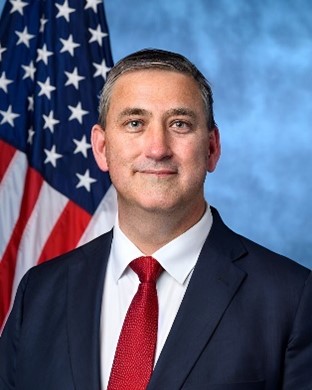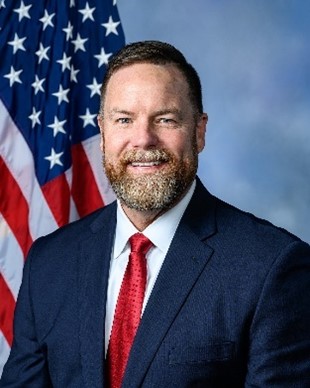2025’s Potential Tax Writers
As the dust settles on the 2024 election, several members on the Senate Finance Committee and the House Ways and Means Committee will be leaving Congress. Brownstein will preview some of the members who could be considered for these committee openings. Our series continues with Reps. Nathaniel Moran (R-TX) and Aaron Bean (R-FL).

Rep. Nathaniel Moran (R-TX)
Nathaniel Moran has served as the representative from Texas’s 1st Congressional District, covering parts of northeastern Texas, since January 2023. Prior to his tenure in Congress, he served on the city council for Tyler, Texas, and as county judge for Smith County. He currently serves on the Education and Workforce, Judiciary, and Foreign Affairs committees.
Rep. Moran has identified the extension of the Tax Cuts and Jobs Act (TCJA, Pub. L. 115-97) as one of his “main priorities” for the 119th Congress, saying in an interview that Congress should “take affirmative action to extend those tax cuts, keep taxes and regulations low on individuals and businesses.” Notably, Rep. Moran was one of 71 Republicans who voted against the Fiscal Responsibility Act, which temporarily suspended the federal debt limit and rescinded $1.4 billion of the $80 billion in funding for the Internal Revenue Service (IRS) established by the Inflation Reduction Act (Pub. L. 117-169). He argued that the bill did not go far enough to reduce the federal debt and did not rescind enough IRS funding provided by the Inflation Reduction Act. Moran has expressed interest in joining the Ways and Means Committee, saying that he wants to “have a seat at the table to shape good tax policy that’s pro-business and pro-growth.”

Rep. Aaron Bean (R-FL)
Aaron Bean has served as the representative from Florida’s 4th Congressional District, covering parts of northeastern Florida, since January 2023. Prior to his tenure in Congress, he served in Florida’s state legislature, eventually becoming president pro tempore of the Florida Senate from 2020 to 2022. He currently serves on the Small Business, Education and Workforce, and Transportation and Infrastructure committees.
Rep. Bean is a noted supporter of extending the Section 199A deduction for passthrough businesses, hosting a roundtable with businesses in Clay County, Florida, to discuss the impact of TCJA tax cuts and the importance of the Section 199A deduction to the daily operation of small and local businesses. He has also supported extending the full deduction for research and development expensing, joining a letter written and cosigned by other members of the Small Business Committee. He is considered a potential candidate to join the Ways and Means Committee due to his advocacy for small businesses and for hailing from the same geographic region of the country as retiring Rep. Drew Ferguson (R-GA).

Legislative Lowdown
CBO Explains TCJA Extension Estimates, Rebuts Lawmakers’ Concerns: On Dec. 4, the Congressional Budget Office (CBO) published a blog post explaining the agency’s methodology for modeling economic effects of the changes in incentives stemming from the expiration of tax provisions, such as the agency’s June estimate of the effects of extending all of the expiring Tax Cuts and Jobs Act (TCJA, Pub. L. 115-97) provisions. That report estimated that a straight extension of all TCJA tax provisions would add $4.6 trillion to the federal deficit, a figure that has been criticized by some lawmakers for not taking into account a potential increase in economic growth that would flow from those TCJA provisions. The lawmakers point out that CBO’s original 2017 estimate of expected receipts, when compared to actual receipts in the ensuring years, totaled $1.5 trillion more revenue than CBO’s original estimates.
The CBO argues that several nonrelated factors led to CBO’s estimated revenue generation being lower than actual results, namely: (1) high inflation resulted in higher revenues, contributing roughly $900 billion in extra revenue; (2) “an increase in real economic activity,” which added about $700 billion; and (3) higher tariffs generating another $250 billion. These estimates were partly offset by other legislation passed after TCJA, including COVID-19 pandemic-relief legislation, resulting in the $1.5 trillion gap between estimated and actual receipts.
Senate Approves Disaster Tax Relief Bill: On Dec. 4, the Senate approved by voice vote the Federal Disaster Tax Relief Act of 2023 (H.R. 5863), which would provide a range of relief for individuals affected by previous wildfires, recent hurricanes and the East Palestine, Ohio, train derailment. Qualified wildfire relief payments, which includes compensation for losses, expenses and damages incurred as a result of a qualified wildfire disaster received in tax years 2020–2025 would also qualify for the income exclusion. This bill was brought to the House floor via a discharge petition led by its author, Rep. Greg Steube (R-FL). The bill also was a component of the Tax Relief for American Families and Workers Act (H.R. 7024), which passed the House on a strong bipartisan vote but did not advance through the Senate.
Trump to Nominate Michael Faulkender as Deputy Treasury Secretary: On Dec. 4, President-elect Donald Trump announced his intention to nominate Michael Faulkender as deputy secretary of the treasury. He would serve with Scott Bessent, who Trump intends to nominate to be treasury secretary, if both are confirmed. Trump wrote in a post on Truth Social that Faulkender “is a distinguished economist and policy practitioner who will drive our America First agenda.” The deputy treasury secretary acts as a second-in-command for the department and would oversee work across the department and its bureaus.
Faulkender served as treasury assistant secretary for economic policy during Trump’s first term, where he was responsible for implementing the Paycheck Protection Program (PPP). The PPP helped businesses pay employee salaries even during stay-at-home orders implemented during the COVID-19 pandemic. While the program was criticized for fraud and abuse, Faulkender and independent researchers have defended the PPP as preventing further job loss throughout the pandemic.
Thune Breaks with House Republicans Over Reconciliation Bills: On Dec. 3, incoming Senate Majority Leader John Thune (R-SD) proposed a plan to pass two budget reconciliation bills: the first, intended to be passed within the first 30 days of Trump’s presidency, would be focused on border and energy issues, while the second would focus on extending crucial provisions in the Tax Cuts and Jobs Act (Pub. L. 117-169). Although House Speaker Mike Johnson (R-LA) tacitly endorsed the plan, it was criticized by several House Republicans, including Ways and Means Committee Chairman Jason Smith (R-MO). Chairman Smith argued that tax policy was a signature issue of Trump’s presidential campaign and that having two reconciliation bills would make extending the TCJA’s expiring provisions more difficult, especially in a second bill. The controversy over the strategy and timeline for reconciliation bills highlights the overarching difficulties Republicans will have to overcome to pass tax legislation, with a lack of consensus on what priorities to include and the extent that offsets will need to be included in the package. Any divisions are especially critical for House Republicans to resolve, as Speaker Johnson will preside over a slim 217-215 majority until April.
Senate Democrats Hold Leadership Election: On Dec. 3, the Senate Democratic Caucus held its leadership elections, reelecting Sen. Chuck Schumer (D-NY) as Democratic Leader and Sen. Dick Durbin (D-IL) as Democratic whip. Sen. Amy Klobuchar (D-MN) was elected to be the chair of the Steering and Policy Committee, and Sen. Cory Booker (D-NJ) was elected as chairman of the Strategic Communications Committee.

Energy-Tax Mainlines
Treasury Department, IRS Finalize Rules on Section 48 Investment Tax Credit: On Dec. 4, the Treasury Department and Internal Revenue Service (IRS) issued final rules on the Section 48 Investment Tax Credit (ITC) for energy-related projects, which was extended and expanded as part of the Inflation Reduction Act (Pub. L. 117-169). The final rules modify and clarify proposed rules released in November 2023 with respect to qualifying energy property, including ownership requirements for geothermal heat pumps, definitions relating to qualified biogas property and thermal energy property, and rules governing hydrogen energy storage property, including a loosening of the “end use” requirement. The rules also clarify the use of the prevailing wage and apprenticeship bonus credit in coordination with the section 48 ITC.
While the section 48 ITC expires at the end of 2024, the final regulations will apply, when printed in the Federal Register (expected to be Dec. 12), to property with construction commencing before the end of the month. Beginning next year, the ITC shifts to the new tech-neutral ITC for electricity production under section 48E (with a related electricity production tax credit under section 45Y). The Treasury Department and the IRS are expected to finalize proposed regulations for the tech-neutral credit regime prior to the end of the Biden administration on Jan. 20, 2025.
Biden Administration Pushes Back on Reports That It Will Not Issue Section 45Z Guidance: On Dec. 3, reports surfaced that the Biden administration would not finalize guidance with respect to the Section 45Z Clean Fuel Production Credit, enacted as part of the Inflation Reduction Act (IRA, Pub. L. 117-169). The credit, along with other IRA credits, is part of the Biden administration’s plans to jumpstart the U.S. sustainable aviation fuels (SAF) industry, a goal that would be more difficult without detailed guidance on the Section 45Z credit, which takes effect on Jan. 1, 2025. A Treasury Department official pushed back on the reports, stating that the Biden administration anticipates releasing guidance on the Section 45Z credit before the president leaves office on Jan. 20, 2025.
Tax Worldview
Trump Hints at Bolstering U.S. Steel Through Tax Incentives and Tariffs: On Dec. 2, President-elect Donald Trump announced on Truth Social that he would seek to block the acquisition of the United States Steel Corporation (U.S. Steel) by Nippon Steel Corporation, a Japanese steelmaker. His decision would follow similar efforts by the Biden administration, which indicated in September that it would await a report from the interagency Committee on Foreign Investment in the United States considering potential national security concerns of the acquisition before making a decision. Both Nippon Steel and U.S. Steel support the acquisition. Trump noted in his post that he would instead seek to use “tax incentives and tariffs” to bolster U.S. Steel and the industry as a whole but did not offer additional details.
1111 Constitution Avenue
Trump to Nominate Billy Long as IRS Commissioner: On Dec. 4, President-elect Donald Trump announced his intention to nominate former Rep. Billy Long (R-MO) to serve as commissioner of the Internal Revenue Service (IRS), writing in a post on Truth Social that Long has “help[ed] small businesses navigate the complexities of complying with the [Internal Revenue Service] rules and regulations” and is a “consummate ‘people person,’ well respected on both sides of the aisle.” Long previously served as a member of Congress, serving as the representative for Missouri’s 7th Congressional District from 2011 to 2023. During his tenure in Congress, Long primarily served in the Energy and Commerce Committee, but not on the Ways and Means Committee.
Long entered the GOP primary in 2022 to succeed then-retiring Sen. Roy Blunt. However, Long was unsuccessful, finishing fourth behind the eventual nominee, now-Sen. Eric Schmitt. Following his congressional tenure, Long transitioned to a role as a “certified business and tax advisor.” Part of his work has involved promoting the pandemic-era Employee Retention Tax Credit (ERTC) to eligible taxpayers, although the program has been prone to fraud and abuse.
Should he be confirmed, Long is expected to support Republicans’ priorities with regard to IRS operations, including simplification of the tax code, reducing IRS personnel and limiting enforcement initiatives. Republicans are likely to try to transition the IRS to a customer-service-oriented agency, prioritizing taxpayer services and clawing back IRS funding appropriated as part of the Inflation Reduction Act (Pub. L. 117-169). The Trump administration is likely to cut funding for or terminate altogether the agency’s Direct File program, an online tax-filing tool first piloted in the 2024 tax-filing season. Republicans have questioned the statutory authority for the Direct File program, as well as its necessity and cost. Private tax preparation companies have opposed the program due to its duplicative nature and lack of coordination with state-tax filing.
Following Trump’s announcement, Senate Finance Committee Chairman Ron Wyden (D-OR) criticized Long as a “bizarre choice” to lead the agency, citing Long’s promotion of the ERTC. He said that he will have “a lot of questions about Mr. Long’s role in this business, first and foremost why the American people ought to trust somebody involved with a fraud-ridden industry to run an agency that’s tasked with rooting out fraud.” Ranking Member Mike Crapo (R-ID) offered a more cautious response, saying that “we haven’t done his vetting” when asked about Long’s qualifications to lead the role.
The announcement also caught current IRS Commissioner Daniel Werfel off guard, as his term as IRS commissioner is not set to expire until Nov. 12, 2027. It is rare for a commissioner to be removed by an incoming president, as Trump has signaled he intends to do. Werfel has previously been optimistic that he would be able to serve out his term, stressing that the IRS is a nonpartisan agency and that he would work to fulfill the incoming administration’s priorities for the Treasury Department and the IRS. This sentiment was echoed by Chairman Wyden, saying that “if Trump fires Mr. Werfel, it won’t be to improve on his work; it’ll be to install somebody Trump can control as he meddles with the IRS."
At a Glance
Finance Committee Executive Session Reveals Rifts on TIGTA Nomination: On Dec. 5, the Senate Finance Committee held an executive session to vote on the nomination of David Samuel Johnson to serve as the Treasury Department inspector general for tax administration. Chairman Ron Wyden (D-OR) urged support for Johnson’s nomination, citing his qualifications. Ranking Member Crapo (R-ID), however, stated that he could not support Johnson’s nomination despite his qualifications, noting that “given that the new Congress will be sworn in only less than a month from today, and the new Administration will take office just shortly thereafter, it is my opinion that these newly elected officials deserve the opportunity to evaluate this appointment.” The Finance Committee nevertheless voted 14-13 along party lines to advance Johnson’s nomination, though the full Senate may not confirm him until after the commencement of the next Congress.
Brownstein Bookshelf
CRFB Publishes Blog Post on Ways to Reduce Cost of TCJA Extensions: On Dec. 3, the Committee for a Responsible Federal Budget (CRFB) published a blog post analyzing options for Congress to consider in scaling back the individual and estate-tax provisions of the Tax Cuts and Jobs Act (TCJA). The report is intended to help Congress prepare for extension in 2025, as estimates suggest that extending the individual and estate provisions would add $3.9 trillion to the federal deficit. The post offers various approaches and estimated savings, such as changes to the phaseout threshold to the Child Tax Credit, repealing the state and local tax (SALT) deduction, and other potential reforms to individual tax brackets, the alternative minimum tax, the estate tax and itemized deductions.
Hearings and Events
House Ways and Means Committee
The House Ways and Means Committee has no tax hearings scheduled for this week.
Senate Finance Committee
The Senate Finance Committee has no tax hearings scheduled for this week.